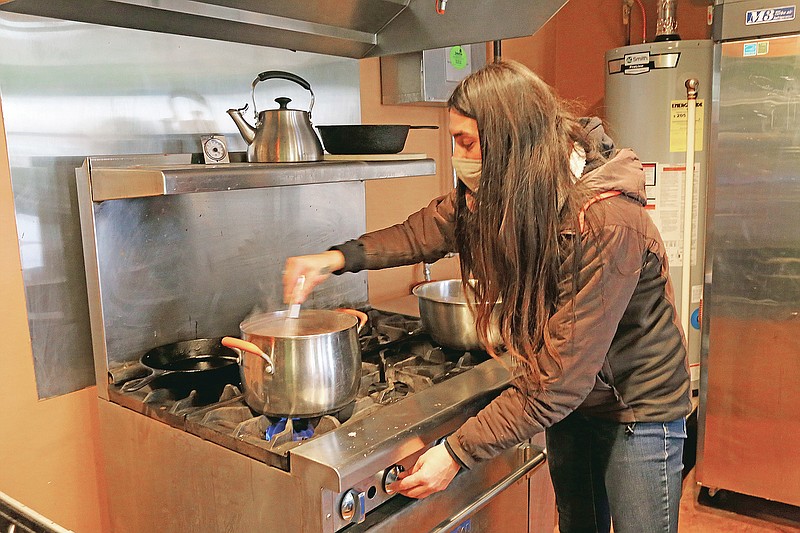MOAB, Utah -- On a cold, gray December morning, a handful of volunteers gathered in a small courtyard next to Moab's youth garden.
Two Navajo women around the age of 40 and an older Navajo man counted out canned goods and hand sanitizer, then put them into reusable grocery bags lined up on the ground.
Kristen Ramirez, who is White Mountain Apache, moved between them, giving directions. She's tall and thin, with long black hair that touched the ground when she reached down to count the bags. They are filled with supplies for Native elders and single mothers around Moab.
"This is traditional steamed corn, which goes to our elders," she said, throwing small sacks of the corn into the bags. "We use it to make mutton stew. It's like home in a bowl."
Ramirez founded Full Circle Intertribal Center in May 2019 in order to help build community among Moab's Native population. Eighteen months later, the nonprofit group has turned its efforts toward keeping Native elders safe during covid-19, as well as added resources for Native residents of Grand and San Juan counties. Ramirez said they have raised $150,000 and delivered over 600 bags of food and cleaning supplies since March.
After filling 30 bags with corn for the elders, Ramirez ducked into a small kitchen next to the courtyard to help prepare blue corn mush for the other volunteers and talk about the group's beginning.
There are around 500 Native people living in Grand County, according to the U.S. Census Bureau. But Ramirez said there wasn't a good place for them to gather and share traditional foods and stories before she started the Full Circle Intertribal Center.
"There's always a sense of community when Natives are together, but it just wasn't something that was an organization," she said, while stirring the mush in a large metal pot. "So it's just really important to us to have programming for Natives, by Natives."
Before the pandemic hit, they held monthly dinners and a cooking circle for women and girls. But covid-19 caused the group to shift its mission to taking care of Native elders, who carry the knowledge and traditions of their people.
Natives between age 60 and 80 are two to three times more likely to die from covid-19, according to the Center for Disease Control. And the virus has killed hundreds of them on the nearby Navajo Nation.
"It's just paramount for us to be able to take care of our relatives, you know, and I feel like that is something that has been forgotten," Ramirez said. She said her organization also offers other services, like help for people affected by stalking or domestic violence.
Miyoshi Lee is on the group's board, which is made up of four Native women. She took a break from packing bags outside to talk about the group's impact.
Before the pandemic, she said the monthly community dinners helped Native youth learn from their elders.
"A lot of the time it's not even really planned," she said. "Like (when the kids are) handing a cup of tea (to an elder) they say, 'Here's your Navajo tea' ... Then the elders will teach them how to say it, where it came from, why it's important and how it's nourishing to our body."
Lee said sharing that knowledge helps create a sense of kinship, which is the group's mission. And delivering the covid-19 supply bags to elders has helped keep those interactions going.
"Whenever I'm around my elders, I just feel really good," she said. "And I feel super empowered because they have gained so much knowledge and they're like our leaders to teach us the things that most generations are losing."
Back in the small kitchen, Ramirez talked about her hopes for the future of Full Circle Intertribal Center as she finished making the blue corn mush.
"I just hope it grows and it's here for future generations," she said. "I do hope that we get a cultural center built here, an intertribal center, in time."
Once the mush thickened up, Ramirez called in the volunteers and served the hot, purple liquid with apricot preserves and a spoonful of sugar.
As the volunteers enjoyed the food, Ramirez talked about the group's plans for the upcoming year. She said they'll begin delivering hot meals to elders with traditional foods and fresh mutton later this month, and they are starting a youth empowerment program.
"Food sovereignty is huge," she said. "I want to do food justice symposiums one day, when we stop pivoting (due to) this national health crisis."
Ramirez could talk for hours about the group's plans, but she had 20 bags of supplies to deliver in the back of her pickup truck and the sun was already setting.

Distributed by The Associated Press.
